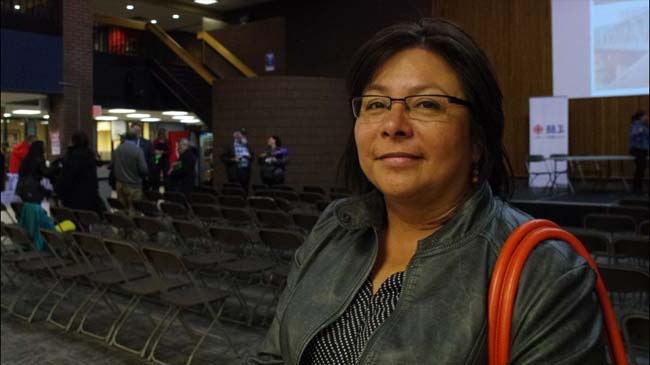Racism forum attempts to build bridges in Thunder Bay

By Rick Garrick
THUNDER BAY – First Nation fears of crime and racism in Thunder Bay were raised during CBC Radio One’s Oct. 1 Building Bridges community forum.
“I’m terrified to walk to the grocery store,” says Lakehead University student and Neskantaga citizen Clyde Moonias. “I’m terrified to even walk home from school at night. And what terrifies me is all the crime that is happening in our city and all the racism that we…as Anishinabe minorities face.”
Moonias raised his concerns after the six Building Bridges panelists — Tesa Fiddler, Lisa Fowler, Karen Drake, Scott Chisholm, Heather Koller and Lisa Primavesi — shared their experiences with cross-cultural relations in the northern Ontario city of about 108,000 people.
Chippewas of the Thames citizen Gloria Hendrick-Laliberte understands Moonias’ concerns, noting she knows youth who were harassed and bothered on Thunder Bay’s streets.
“I understand the parent’s feeling when my daughter is not home by a certain time or doesn’t respond to texts or phone calls,” says Hendrick-Laliberte. “I certainly do get worried given the track record of missing Aboriginal women in the city.”
Hendrick-Laliberte, who has lived in Thunder Bay for more than 25 years, fears for her children’s safety.
“I don’t want them to ride the city bus, I don’t want them to walk alone on city streets,” Hendrick-Laliberte says. “We give our daughter a ride whenever we can and make sure that she is always with someone.”
Although Hendrick-Laliberte has also experienced racism in southern Ontario, she feels it will take a long time to make Thunder Bay a safer city for First Nations people.
“I feel that it is just embedded in the thread of this society, that it is OK to treat Aboriginal people poorly,” Hendrick-Laliberte says. “But I have seen small and positive changes in education. People are getting educated, people are becoming aware of the issues and people are asking questions and want to address what is happening in the city.”
Hendrick-Laliberte suggests sports as one way to bring about change.
“Sport and recreation are not race related, they are based on ability and everyone having fun and participating together,” says Hendrick-Laliberte. “The people involved in creating opportunity for youth to be active and healthy are building bridges in a very positive way.”
Steve Koptie, a Six Nations citizen who recently moved to Thunder Bay from Georgina Island, was disturbed by the forum.
“From the flyers and the reaction and some of the commentary, it was quite disturbing, actually, for somebody who has been part of making change and making people aware of the situation,” says Koptie. “I come from an area where we had Caledonia, so those damaged relationships can impact and continue. Caledonia is still unresolved.”
Koptie says he and his wife Cynthia Wesley-Esquimaux, Lakehead University’s vice provost Aboriginal Initiatives, have experienced some “troubles” since moving to Thunder Bay.
“I think these forums and these gatherings — I was at the Walk a Mile too — I think that is a positive and hopeful sign,” Koptie says. “But there is still a lot of work.”


